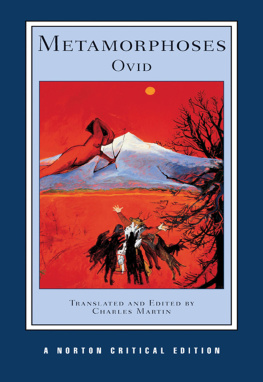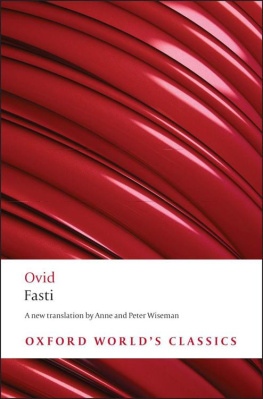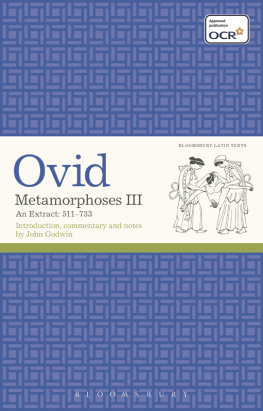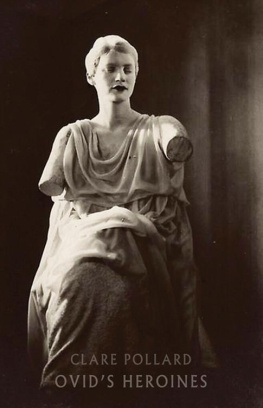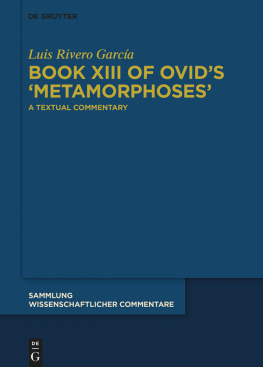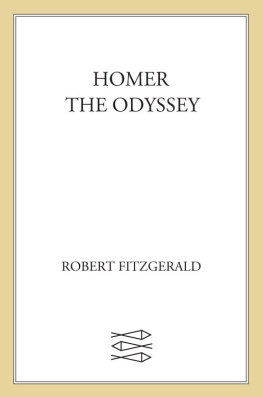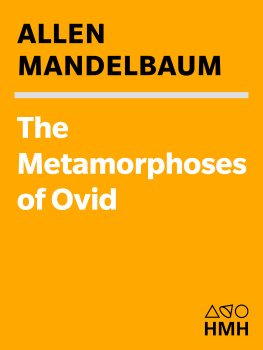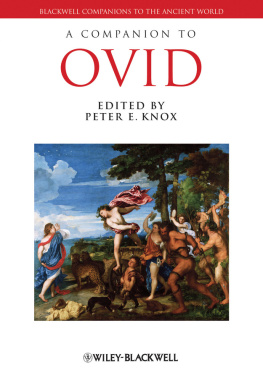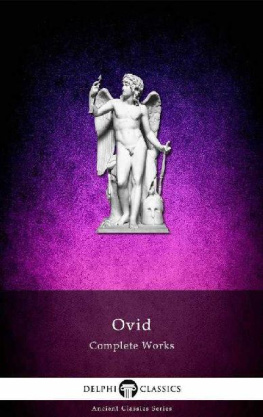Ovid - Ovid: Metamorphoses
Here you can read online Ovid - Ovid: Metamorphoses full text of the book (entire story) in english for free. Download pdf and epub, get meaning, cover and reviews about this ebook. year: 1998, publisher: Oxford University Press, genre: Detective and thriller. Description of the work, (preface) as well as reviews are available. Best literature library LitArk.com created for fans of good reading and offers a wide selection of genres:
Romance novel
Science fiction
Adventure
Detective
Science
History
Home and family
Prose
Art
Politics
Computer
Non-fiction
Religion
Business
Children
Humor
Choose a favorite category and find really read worthwhile books. Enjoy immersion in the world of imagination, feel the emotions of the characters or learn something new for yourself, make an fascinating discovery.

- Book:Ovid: Metamorphoses
- Author:
- Publisher:Oxford University Press
- Genre:
- Year:1998
- Rating:4 / 5
- Favourites:Add to favourites
- Your mark:
- 80
- 1
- 2
- 3
- 4
- 5
Ovid: Metamorphoses: summary, description and annotation
We offer to read an annotation, description, summary or preface (depends on what the author of the book "Ovid: Metamorphoses" wrote himself). If you haven't found the necessary information about the book — write in the comments, we will try to find it.
Ovid: Metamorphoses — read online for free the complete book (whole text) full work
Below is the text of the book, divided by pages. System saving the place of the last page read, allows you to conveniently read the book "Ovid: Metamorphoses" online for free, without having to search again every time where you left off. Put a bookmark, and you can go to the page where you finished reading at any time.
Font size:
Interval:
Bookmark:
OXFORD WORLDS CLASSICS
METAMORPHOSES
A. D. MELVILLE was a scholar of Kings College, Cambridge, where he gained a double First in Classics and won a Craven Studentship. His love of the Classics was kindled at Charterhouse and he discovered the seductive charms of Ovid at Kings. After a long career as a solicitor in London, interrupted by distinguished service in the Second World War, he returned to Ovid, and his translations of the Metamorphoses, the Love Poems, and Sorrows of an Exile (Tristia) are all available in Worlds Classics.
E. J. KENNEY is a Fellow of Peterhouse and Emeritus Kennedy Professor of Latin in the University of Cambridge. His previous publications include a critical edition of Ovids amatory poems (Oxford Classical Texts, 1961), an edition with commentary of Lucretius, De Rerum Natura III (1971), The Classical Text. Aspects of editing in the age of the printed book (1974), The Ploughmans Lunch. Moretum: a poem ascribed to Virgil (1984); and he is Editor of and a contributor to The Cambridge History of Classical Literature, Vol. II, Latin Literature (1982).
This ought to become the standard modern complete verse translation.
Greece & Rome
Melvilles new translation enables us to understand this unique and witty poetic narrative with a fresh approach. His use of modern idiom and of occasional rhyming couplets for added special effect are a great bonus and a delight to readers. The text is highly recommended to both students and readers who have a special interest in the subject.
Greek Review
Melville has produced a fluent and readable version which conveys a sense both of Ovids wit and of his elegance.
Classical Review
Melville has chosen blank verse, pleasantly varied by rhymed couplets to round off each sequence. His narrative is taut, his vocabulary vivid and flexible, his speeches pungent or powerful, and his command of wit a delight.
Classical World
OXFORD WORLDS CLASSICS
For over 100 years Oxford Worlds Classics have brought readers closer to the worlds great literature. Now with over 700 titlesfrom the 4,000-year-old myths of Mesopotamia to the twentieth centurys greatest novelsthe series makes available lesser-known as well as celebrated writing.
The pocket-sized hardbacks of the early years contained introductions by Virginia Woolf, T. S. Eliot, Graham Greene, and other literary figures which enriched the experience of reading. Today the series is recognized for its fine scholarship and reliability in texts that span world literature, drama and poetry, religion, philosophy, and politics. Each edition includes perceptive commentary and essential background information to meet the changing needs of readers.
Refer to the to navigate through the material in this Oxford Worlds Classics ebook. Use the asterisks (*) throughout the text to access the hyperlinked Explanatory Notes.
OXFORD WORLDS CLASSICS

OVID

Translated by
A. D. MELVILLE
With an Introduction and Notes by
E. J. KENNEY


Great Clarendon Street, Oxford OX2 6DP
Oxford University Press is a department of the University of Oxford.
It furthers the Universitys objective of excellence in research, scholarship,
and education by publishing worldwide in
Oxford New York
Athens Auckland Bangkok Bogot Buenos Aires Calcutta
Cape Town Chennai Dar es Salaam Delhi Florence Hong Kong Istanbul
Karachi Kuala Lumpur Madrid Melbourne Mexico City Mumbai
Nairobi Paris So Paulo Shanghai Singapore Taipei Tokyo Toronto Warsaw
with associated companies in Berlin Ibadan
Oxford is a registered trade mark of Oxford University Press
in the UK and in certain other countries
Published in the United States
by Oxford University Press Inc., New York
Translation, Translators Note, Glossary, and Index of names
A. D. Melville 1986
Introduction, Historical Sketch, and Explanatory Notes
E. J. Kenney 1986
The moral rights of the author have been asserted
Database right Oxford University Press (maker)
First published 1986 by Oxford University Press
First issued as a Worlds Classics paperback 1987
Reissued as an Oxford Worlds Classics paperback 1998
All rights reserved. No part of this publication may be reproduced, stored in a retrieval system, or transmitted, in any form or by any means, without the prior permission in writing of Oxford University Press, or as expressly permitted by law, or under terms agreed with the appropriate reprographics rights organizations. Enquiries concerning reproduction outside the scope of the above should be sent to the Rights Department, Oxford University Press, at the address above
You must not circulate this book in any other binding or cover
and you must impose this same condition on any acquirer
British Library Cataloguing in Publication Data
Data available
Library of Congress Cataloging in Publication Data
Ovid, 4317 or 18 B.C.
Metamorphoses.
Bibliography: p.
Includes index.
I. Title.
PA6522.M2M45 1986 873.01 8515479
ISBN 019283472X
UXORI NATISQUE CARISSIMIS
Dr S. E. Hinds has kindly read the Introduction and the Explanatory Notes in draft, and I am indebted to him for many helpful criticisms and acute suggestions, the majority of which I have gratefully adopted.
E.J.K.
OVID (Publius Ovidius Naso) was born on 20 March 43 BC at Sulmo (now Sulmona) in the Abruzzi. The year of his birth was long remembered as that in which both consuls fell fighting Antony at Mutina, leaving Octavian (the future Augustus) in a position of strength which he exploited to become Triumvir and eventually sole ruler of the Roman world. In view of Ovids fate at his hands it is not surprising that in the poem which is our chief source for his life (Tristia iv. 10) he lays some stress on these circumstancesmore especially as there was a contemporary report that the deaths of both consuls had in fact been compassed by Octavian (Tacitus, Annals i. 10. 2, Suetonius, Augustus 11). By the time that Ovid came to manhood the combined forces of Antony and Cleopatra had been routed at Actium (31 BC) and the Roman Republic had been transformed into an (ostensibly) benevolent despotism.
Ovids family was prosperous, and he was sent to Rome to study under the leading teachers of the day. For Roman boys education then and for centuries to come was verbal, literary and rhetorical, its principal aim the production of fluent and convincing extempore speakers. The reminiscences of the elder Seneca (Controversies ii. 2. 812, ix. 5. 17) illustrate vividly the effects of this kind of training on Ovid, in whom it encouraged and developed an obviously innate delight in words, their metrical arrangement and artistic manipulation. Possibly the encouragement went too far: Quintilian thought that he would have been a better poet if he had controlled his genius rather than letting it control him (Institutio Oratoria x
Next pageFont size:
Interval:
Bookmark:
Similar books «Ovid: Metamorphoses»
Look at similar books to Ovid: Metamorphoses. We have selected literature similar in name and meaning in the hope of providing readers with more options to find new, interesting, not yet read works.
Discussion, reviews of the book Ovid: Metamorphoses and just readers' own opinions. Leave your comments, write what you think about the work, its meaning or the main characters. Specify what exactly you liked and what you didn't like, and why you think so.


